

Vivian Thorp was 28 years old when she ripped a ligament in her knee lifting heavy freight at Walmart in Vallejo, California. Until then, she’d liked her job and was good at it. “I was always strong and agile, and I had the skills for a physical job,” she says. “I helped set up that store.” But when the injury laid her up, she found herself adrift in the job market. “I wasn’t skilled for anything else other than waitressing or shipping and receiving,” she says. “I got really deeply depressed.”
Her life began to unravel. A bank repossessed the rental she was living in. The father of her baby daughter Jasmine, born in 1994, left Thorp and returned to England. In 1997, four years after the accident, Walmart finally paid her $20,000 for medical expenses and lost income, but more than half of it went to pay back workers’ compensation.
» Read more about: California's Worst Law — And What's Behind the Repeal Movement »


We hear so much about “big government” burdening “job creators” with excessive “red tape” and “bureaucracy,” but that rhetoric isn’t new. Even in the decades after the New Deal, when workers had more power than they do today, and the government was seen as society’s protector, private profit too often conflicted with the public interest.
Take the sleeping drug thalidomide, which caused thousands of infant deaths and birth deformities across Europe in the early 1960s. Before being linked to those defects, the drug reached the desk of Dr. Frances Oldham Kelsey, a medical officer at the U.S. Food and Drug Administration. Dr. Kelsey saw something odd in the drug trials performed by the pharmaceutical company that manufactured thalidomide, and requested more tests. The company, with profits at stake, bullied her to approve the drug, even threatening a lawsuit.
Meanwhile, evidence from Europe began to pour in that thalidomide was toxic if taken during pregnancy.
» Read more about: How Dr. Frances Kelsey's 'Red Tape' Saved Thousands of Infants »


On Tuesday California Attorney General Kamala D. Harris released the full title and summary text for the Public Employees Pension and Retiree Healthcare Benefits Initiative Constitutional Amendment. The title is a mouthful, but the initiative’s wording is just six sentences long.
Its first two lines read: “Eliminates constitutional protections for vested pension and retiree healthcare benefits for current public employees, including those working in K-12 schools, higher education, hospitals and police protection, for future work performed. Adds initiative/referendum powers to Constitution, for determining public employee compensation and retirement benefits.”
Crucially, Harris omits mention of “empowering” voters — a main selling point that had been advertised by former San Jose mayor Chuck Reed, former San Diego City Councilman and Tea Party member Carl DeMaio, and four others. In June this group submitted their proposed ballot initiative to Harris as the Voter Empowerment Act of 2016. Harris’ new title weakens their cause,


The nation’s largest county government is poised to move forward Tuesday with a plan that critics say could roll back innovative public health programs and compromise everything from infectious disease containment to the prevention of smoking, obesity and sexually transmitted diseases.
On August 11, the Los Angeles County Board of Supervisors will vote on a proposed consolidation of three health agencies — the Department of Health Services (DHS), the Department of Public Health (DPH) and the Department of Mental Health (DMH). The plan has the backing of liberal supervisors Mark Ridley-Thomas and Sheila Kuehl, as well as their conservative colleague Mike Antonovich — all of whom argue that it will improve care but are opposed by an array of public health and mental health advocates.
“This consolidation has the potential to cripple public health,” said a high-ranking official with DPH, who spoke on the condition of anonymity.


This week, the American Correctional Association (ACA) will hold its annual conference in Indianapolis, where thousands of government corrections officials, including wardens, jail administrators and sheriffs, will attend workshops and connect with their peers from across the country. Workshops include best practices for successful reentry programs for released inmates and working in corrections across generations.
But many workshops and events will feature a Who’s Who of private corrections companies, including Corrections Corporation of America (CCA), GEO Group, Aramark, Corizon and Telmate.
Those companies should be familiar—many have been prominent in reports we’ve released over the past few years detailing the suffering of inmates in private hands, such as thousands of medical malpractice claims and stories about maggots appearing in prison food.
On the eve of the ACA conference, we have released a new report revealing how such conferences allow corrections companies to influence government officials in ways outside the public’s oversight.
» Read more about: Politically Correctional: How Businesses Game Prison Conferences »


On Tuesday, California Attorney General Kamala Harris will release the official title and summary that will appear on the 2016 ballot for former San Jose mayor Chuck Reed’s latest statewide public-sector pension cutting initiative.
That language will finally end speculation on how far Harris will go in describing the sweeping scope of the proposed constitutional amendment. Legal analysts have charged that it contains a hidden trigger aimed at not just slashing pension benefits but annihilating 60 years of state pension law along with the vast retirement systems that together guarantee the retirement promises made to California’s public employees.
Initial clues as to what might appear on the 2016 ballot emerged last week as the first formal responses by state officials to the proposed measure began to trickle in.
The stakes for all Californians in the so-called “Voter Empowerment Act of 2016” couldn’t be higher.
For Reed and his supporters,
» Read more about: Countdown to Disaster: Grim Official Estimates on 2016 Pension Cutting Measure »


I’ve always believed that democracy was the best form of government because people can change it. And like a lot of us, I was taught that the American form of democracy was the model that should be imitated by nations across the planet. Especially ingenious was the system of “checks and balances.” This arrangement means that no one branch of government can singularly decide a political course without the consent of the others.
This much-praised system was adopted to prevent the re-emergence of an autocracy. But checks and balances also worked to keep the practice of slavery alive up until the Civil War. And in the wake of abolition, when corporations became the dominant form of business organization, the same systems were used to exploit the labor force. Even as the country’s wealth grew, the gap between rich and poor widened. It took more than half a century of effort and the devastation of the Great Depression before important reforms like a minimum wage,
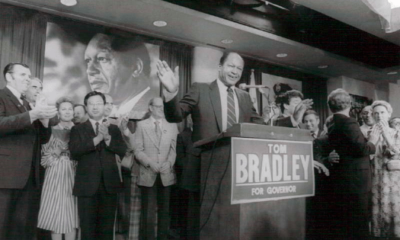

Any informed discussion about the politics and history of Los Angeles over the last century would have to include a critical assessment of the life and legacy of Tom Bradley. In the new documentary Bridging the Divide: Tom Bradley and The Politics of Race, filmmakers Lyn Goldfarb and Alison Sotomayor provide an in-depth look into Bradley’s life and career and their lasting impact on the city’s history, culture and political life. The two recently spoke with Capital & Main. [divider]
Capital & Main: What were your main reasons for doing this documentary?
Goldfarb: Because many of us don’t have a clear understanding about the history of Los Angeles. I think Tom Bradley’s story helps us understand LA better, who we are, and how we got to where we are.
 Sotomayor: When Tom Bradley became the first African American mayor elected in a major U.S.
Sotomayor: When Tom Bradley became the first African American mayor elected in a major U.S.
» Read more about: Bridging the Divide: New Documentary Explores Former L.A. Mayor Tom Bradley »
I don’t know about you, but I love public parks. City parks for hiking, little league, and summer concerts. State parks for camping. National parks like the Grand Canyon to experience the awe of nature. Parks are some of our most precious public assets.
But only if they remain public. This week, candidates in Kentucky’s gubernatorial election suggested that the state could privatize parks to raise revenue. That’s a misguided solution to the wrong problem: the state’s failure to invest enough in essential public assets. Advocates of privatization say the private sector will attract more tourists. But that would jeopardize the central mission of public parks to provide affordable access to nature and recreation. Parks managed by companies, like other private assets, will need to generate profit—funds that should be spent on maintaining and improving them.
The citizens of Kentucky aren’t alone. To manage the 14 million acres of state park lands in the U.S.,


As lobbyists and state legislators gathered at San Diego’s Grand Hyatt resort last week for the three-day annual meeting of the American Legislative Exchange Council (ALEC), the delegates seemed to barely glance at the several dozen exhibitor tables that made up a sort of carnival sideshow of right-wing groups outside the hotel’s second-floor warren of meeting rooms.
Convention attendees had more pressing concerns. Namely, turning this year’s corporate wish list into the infamous boilerplate bills known as “model laws” that would aspire to undermine things like health and environmental standards, worker rights, campaign-spending limits and implementation of the Affordable Care Act (ACA) across the 50 states.
See more of our coverage of the ALEC Annual Meeting
Many of the exhibitor booths were occupied by familiar ALEC friends, such as the collection of extreme-right think tanks known as the State Policy Network,
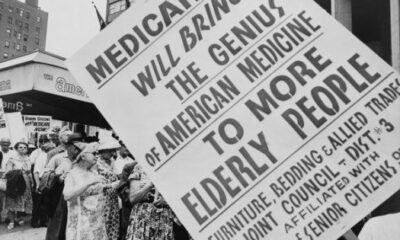
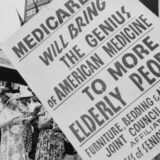
Fifty years ago this month, on July 30, 1965, President Lyndon Johnson signed into law an amendment to the Social Security Act that established Medicare, providing health insurance to people 65 and older regardless of income or medical history, and dramatically changed the landscape of senior health care for the better. As we celebrate this important anniversary, all of us should take a moment to consider how Medicare, the nation’s most successful and efficient health insurance program, continues to protect millions of seniors who might otherwise live without adequate health care or who might face bankruptcy because of medical bills.
As Medicare has been weaved into the fabric of our society, it’s hard to fathom a time when America placed its aging population at such risk, but prior to Medicare only 50 percent of Americans 65 and older had health insurance, and more than a third lived in poverty.
» Read more about: Celebrating Medicare’s 50th by Ensuring Medicare for All »


Scott Walker couldn’t have asked for more.
When the Wisconsin governor took the dais Thursday at the American Legislative Exchange Council’s annual conference in San Diego, his audience was ravenous for any vision that included destroying unions and cracking down on America’s criminal underclass.
See more of our coverage of the ALEC Annual Meeting
The venue was the plenary croissants-and-eggs breakfast, but it would be hard to imagine an audience hungrier for the red meat Governor Walker threw out to it.
Every key bill Walker has been associated with, since his get-tough-on-crime heyday as a state assemblyman in the 1990s, has been a plagiarism of an ALEC model bill. Such as laws that eliminated parole (and ballooned state prison populations) or that imposed a voter ID law, gutted public education and teacher protections, and made Wisconsin the 25th right-to-work state.
Walker himself isn’t an actual member of the secretive corporate lobbying network (ALEC only admits legislators,
» Read more about: ALEC Confidential: Scott Walker Talks the Walk »
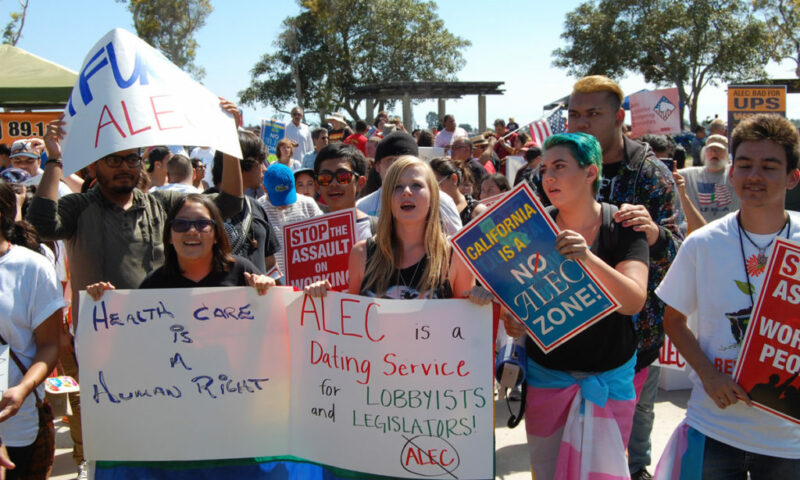

For several tense hours yesterday San Diego’s plush Manchester Grand Hyatt hotel, located in the city’s Embarcadero district, felt more like Athens’ besieged Parliament than a resort on California’s laid-back shoreline.
Around 2 p.m. the hotel, which is playing host to this year’s annual meeting of the American Legislative Exchange Council (ALEC), sealed off all entrances except its main lobby in what became a virtual lockdown.
See more of our coverage of the ALEC Annual Meeting
For the 1,300 state legislators and corporate lobbyists gathered inside, the perceived security threat turned out to be from those who stand the most to lose from ALEC attacks on workplace rights, minimum wage laws and state health and environmental standards — California workers.
An estimated 2,500 protestors, carrying placards declaring California to be an “ALEC-Free Zone,” gathered around 1 p.m. in Embarcadero Marina Park to hear a series of speakers lambasting the secretive,
» Read more about: Labor Rally Sends ALEC Conference Into Lockdown Mode »
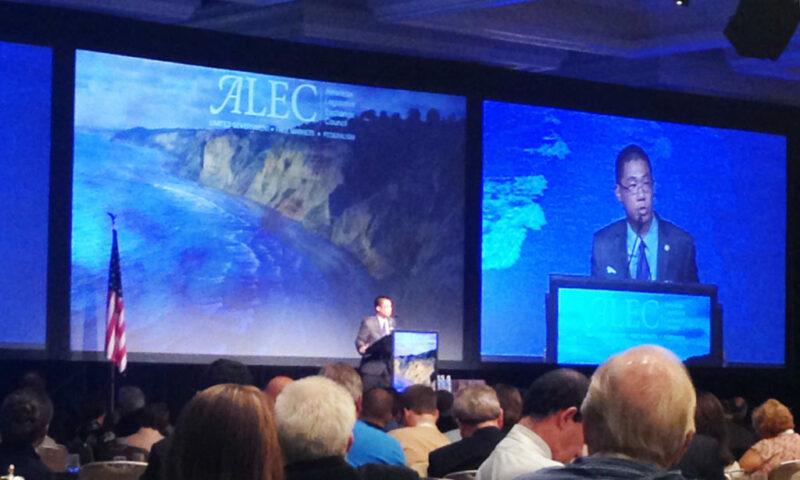

The 42nd Annual Meeting of the American Legislative Exchange Council (ALEC) got underway in earnest Wednesday at San Diego’s Manchester Grand Hyatt resort hotel. The mood was convivial and the attire corporate casual: Brooks Brothers suits without ties, Dockers and sports shirts.
Although this year’s star attractions — a GOP presidential frontrunner, Wisconsin Governor Scott Walker, and a returning presidential contender, former Arkansas Governor Mike Huckabee — weren’t scheduled to speak until Thursday, conference delegates had plenty to do yesterday.
The packed opening luncheon featured Iowa’s virulently anti-immigrant Congressman, Steve King.
ALEC, a secretive rightwing bill mill that gets its funding from the Koch Brothers and global multibillion dollar corporations, has been described as a legislative dating service that arranges hookups between mostly Republican state lawmakers and corporate lobbyists.
See more of our coverage of the ALEC Annual Meeting
The actual “dates” occur at meetings like those unfolding in San Diego — a council spokesperson said 1,300 conferees were in attendance — and take place behind locked doors,
» Read more about: ALEC Confidential: Inside the San Diego Conference »


The line of people standing outside the event in downtown Los Angeles snaked out the door and down to a sidewalk—but there were no velvet ropes and it wasn’t at Nokia Center or L.A. LIVE. The venue was the Kenneth Hahn County Hall of Administration.
The hundreds who waited Tuesday morning in muggy heat had come to weigh in on a measure before the Board of Supervisors to increase the minimum wage in L.A. County’s unincorporated areas.
Perla Lagunas and her kids traveled from North Hills in the San Fernando Valley to show support. “I represent a low-income community,” she said. Her mother was a garment worker who struggled with bills and groceries. “My mom worked with people who wouldn’t pay her a good wage. We grew up so poor– sometimes we didn’t have food. We want to let the community know—wake up!”
Representatives from the National Council of Jewish Women stood in line to enter the hearing.


The town of Coatesville, Pennsylvania, outside of Philadelphia, is a former steel mill town full of struggling residents. With a per capita income of $14,079, Coatesville is situated in wealthy Chester County, but it has struggled amid a declining population and lack of job opportunities. Missoula, Montana, on the other hand, was once a thriving lumber town. Its per capita income of $17,166 means it’s slightly wealthier than Coatesville, and the University of Montana and two hospitals are major employers for the city.
Two thousand, three hundred miles separate Coatesville from Missoula, but the two towns have more in common than you might think. One important similarity? Their ongoing struggles with private, for-profit water companies, like too many cities around the U.S.
Coatesville officials sold the public water utility in 2001, hoping to use the one-time cash infusion to spark an urban renaissance while the privately-run PAWC promised to invest in desperately needed modernization and maintenance.


When Democratic former San Jose mayor Chuck Reed and Republican ex-San Diego councilmember Carl DeMaio finally unveiled the language for a promised attempt at getting a statewide public pension cutting measure to 2016 voters, the expectation was that Reed II would be a reined-in and more realistically-framed version of Reed I – last year’s failed attempt at undermining the public pension system.
That try for the 2014 ballot was aborted after Attorney General Kamala Harris slapped it with a candid, albeit politically untenable summary that frankly described the proposed constitutional amendment as targeting longstanding legal rights—rights that protect the pensions and retirement health care of the 1.64 million Californians enrolled in the state’s public pension systems.
But even veterans of the state’s public-sector retirement wars were unprepared for the sheer scale of what awaited them this time around.
» Read more about: Measure of Deception: CA Initiative Would Gut Retirement Benefits for Millions »


Edward Navales realized a career in large tech firms wasn’t for him, and in 2008 he decided to open his own business. Armed with a University of Texas MBA and guided by a desire to do something meaningful, he decided to start a firm in the health care sector. As he surveyed his options, it seemed like a franchise agreement would be the quickest and surest way to success.
He invested savings, took out a Small Business Administration loan and entered into an agreement with Bright Star Healthcare, a small but fast-growing home health care company. Bright Star promised its franchisees support and flexibility. According to Navales, the reality was something else entirely.
“What I found was inadequate support, unrealistic and predatory minimum sales targets and costly vendor requirements,” Navales said. “I soon learned my fellow franchisees were experiencing the same challenges.” Bright Star, claimed Navales, wasn’t responsive to their requests and complaints,
» Read more about: Step Back, Big Mac: California Franchisees Score Major Victory »
By now, you have probably heard about the riot at the for-profit Kingman Prison in Arizona. Days of unrest at the prison, run by the privately-held Management Training Corporation, left 15 wounded and forced nearly 1,000 incarcerated people to be transferred to other facilities. The same facility also suffered from a major riot in 2010. Similarly, people detained at an MTC-run camp in Texas names Willacy rioted earlier this year, forcing that facility to close completely.
The Kingman riots are focusing renewed attention on the Arizona legislature’s long, cozy relationship with the private prison industry. The repeated failings of for-profit prison operators have led Arizonans and the editorial board for the state’s largest paper to ask some big questions:
» Read more about: Questions Surround Private Prisons After AZ Riot »


Hopes were high among environmentalists when a bill designed to protect California’s drinking water was introduced in the state Assembly earlier this year. After all, California has passed some of the most far-reaching environmental laws and regulations in the nation, and the state legislature is dominated by the Democratic Party, whose members are generally inclined to vote for tougher environmental standards. Moreover, California is in the midst of a massive drought, which gave the bill more urgency. And besides, clean water isn’t a threatened desert flower or endangered minnow – it’s something everyone depends on for existence.
It never had a chance.
The measure, Assembly Bill 356 (Das Williams, D-Carpinteria), was intended to protect underground sources of drinking water from oil and gas wastewater disposal and enhanced oil recovery treatments, and called for monitoring near certain injection wells. That immediately put it in the crosshairs of the most powerful oil interests in California,
» Read more about: How Democrats Mixed Oil and Water, Killing Environmental Bill »